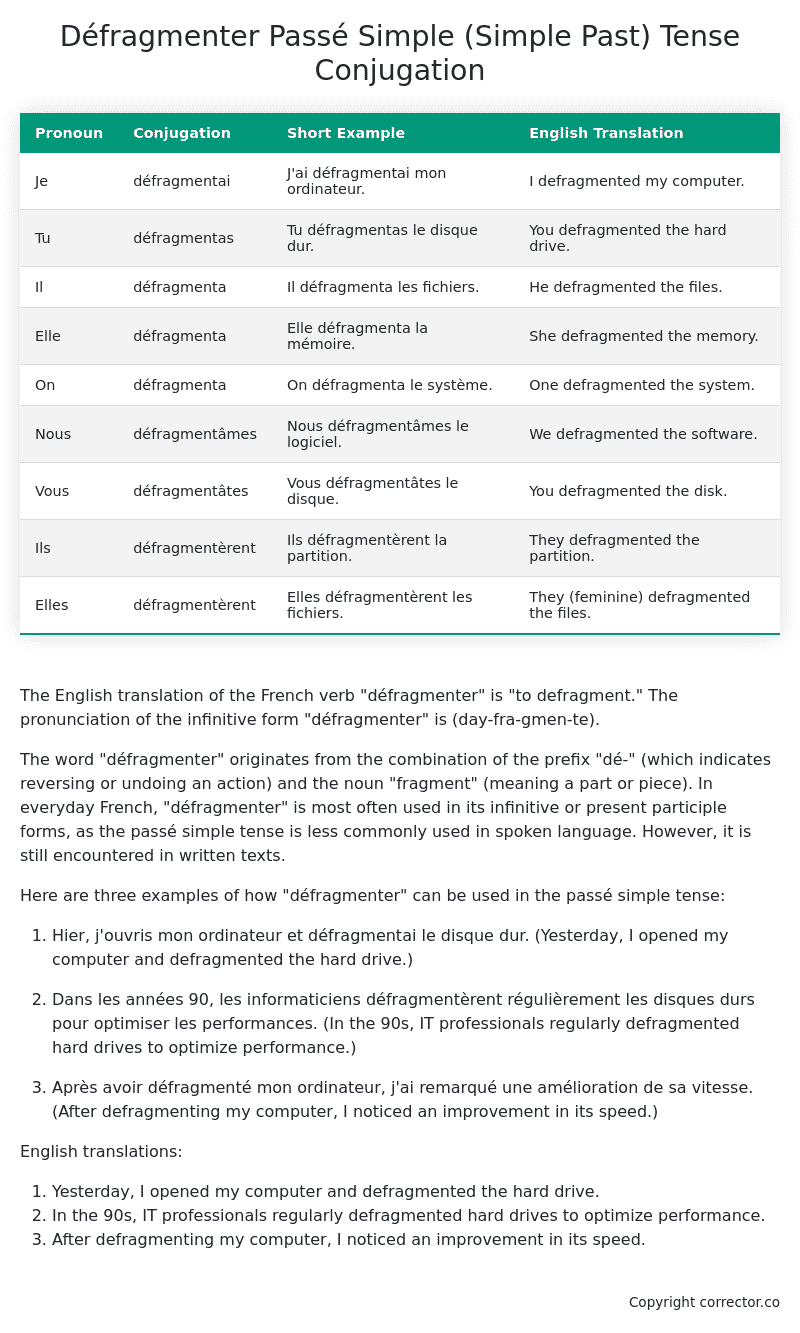Passé Simple (Simple Past) Tense Conjugation of the French Verb défragmenter
Introduction to the verb défragmenter
The English translation of the French verb “défragmenter” is “to defragment.” The pronunciation of the infinitive form “défragmenter” is (day-fra-gmen-te).
The word “défragmenter” originates from the combination of the prefix “dé-” (which indicates reversing or undoing an action) and the noun “fragment” (meaning a part or piece). In everyday French, “défragmenter” is most often used in its infinitive or present participle forms, as the passé simple tense is less commonly used in spoken language. However, it is still encountered in written texts.
Here are three examples of how “défragmenter” can be used in the passé simple tense:
-
Hier, j’ouvris mon ordinateur et défragmentai le disque dur.
(Yesterday, I opened my computer and defragmented the hard drive.) -
Dans les années 90, les informaticiens défragmentèrent régulièrement les disques durs pour optimiser les performances.
(In the 90s, IT professionals regularly defragmented hard drives to optimize performance.) -
Après avoir défragmenté mon ordinateur, j’ai remarqué une amélioration de sa vitesse.
(After defragmenting my computer, I noticed an improvement in its speed.)
English translations:
- Yesterday, I opened my computer and defragmented the hard drive.
- In the 90s, IT professionals regularly defragmented hard drives to optimize performance.
- After defragmenting my computer, I noticed an improvement in its speed.
Table of the Passé Simple (Simple Past) Tense Conjugation of défragmenter
| Pronoun | Conjugation | Short Example | English Translation |
|---|---|---|---|
| Je | défragmentai | J’ai défragmentai mon ordinateur. | I defragmented my computer. |
| Tu | défragmentas | Tu défragmentas le disque dur. | You defragmented the hard drive. |
| Il | défragmenta | Il défragmenta les fichiers. | He defragmented the files. |
| Elle | défragmenta | Elle défragmenta la mémoire. | She defragmented the memory. |
| On | défragmenta | On défragmenta le système. | One defragmented the system. |
| Nous | défragmentâmes | Nous défragmentâmes le logiciel. | We defragmented the software. |
| Vous | défragmentâtes | Vous défragmentâtes le disque. | You defragmented the disk. |
| Ils | défragmentèrent | Ils défragmentèrent la partition. | They defragmented the partition. |
| Elles | défragmentèrent | Elles défragmentèrent les fichiers. | They (feminine) defragmented the files. |
Other Conjugations for Défragmenter.
Le Present (Present Tense) Conjugation of the French Verb défragmenter
Imparfait (Imperfect) Tense Conjugation of the French Verb défragmenter
Passé Simple (Simple Past) Tense Conjugation of the French Verb défragmenter (You’re reading it right now!)
Passé Composé (Present Perfect) Tense Conjugation of the French Verb défragmenter
Futur Simple (Simple Future) Tense Conjugation of the French Verb défragmenter
Futur Proche (Near Future) Tense Conjugation of the French Verb défragmenter
Plus-que-parfait (Pluperfect) Tense Conjugation of the French Verb défragmenter
Passé Antérieur (Past Anterior) Tense Conjugation of the French Verb défragmenter
Futur Antérieur (Future Anterior) Tense Conjugation of the French Verb défragmenter
Subjonctif Présent (Subjunctive Present) Tense Conjugation of the French Verb défragmenter
Subjonctif Passé (Subjunctive Past) Tense Conjugation of the French Verb défragmenter
Subjonctif Imparfait (Subjunctive Imperfect) Tense Conjugation of the French Verb défragmenter
Conditionnel Présent (Conditional Present) Tense Conjugation of the French Verb défragmenter
Conditionnel Passé (Conditional Past) Tense Conjugation of the French Verb défragmenter
Conditionnel Passé II (Conditional Past II) Tense Conjugation of the French Verb défragmenter
L’impératif Présent (Imperative Present) Tense Conjugation of the French Verb défragmenter
L’impératif Passé (Imperative Past) Tense Conjugation of the French Verb défragmenter
L’infinitif Présent (Infinitive Present) Tense Conjugation of the French Verb défragmenter
L’infinitif Passé (Infinitive Past) Tense Conjugation of the French Verb défragmenter
Le Participe Présent (Present Participle) Tense Conjugation of the French Verb défragmenter
Le Participe Passé (Past Participle) Tense Conjugation of the French Verb défragmenter
Struggling with French verbs or the language in general? Why not use our free French Grammar Checker – no registration required!
Get a FREE Download Study Sheet of this Conjugation 🔥
Simply right click the image below, click “save image” and get your free reference for the défragmenter Passé Simple tense conjugation!

Défragmenter – About the French Passé Simple (Simple Past) Tense
Formation
Usage
Narration
Historical Context
Interactions with other tenses
Passé Composé
Imparfait
Conditional and Subjunctive
Summary
I hope you enjoyed this article on the verb défragmenter. Still in a learning mood? Check out another TOTALLY random French verb conjugation!


